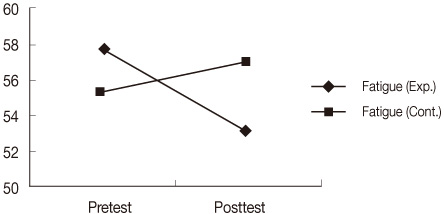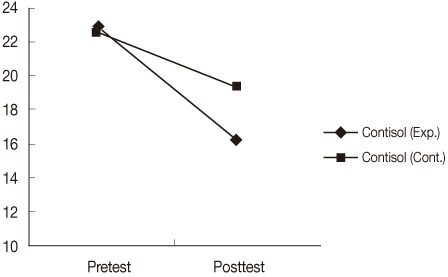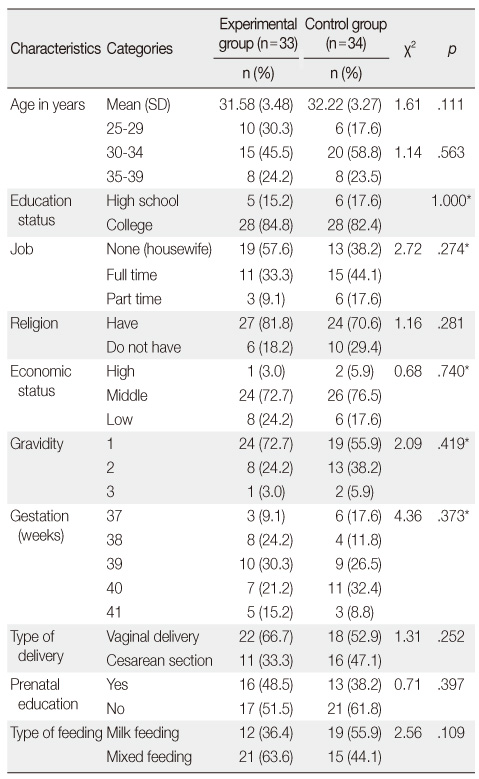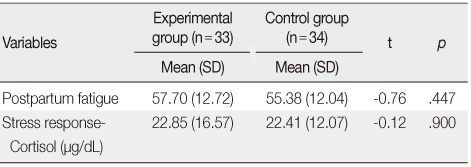Articles
- Page Path
- HOME > J Korean Acad Nurs > Volume 41(3); 2011 > Article
-
Original Article
- Effects of Laughter Therapy on Postpartum Fatigue and Stress Responses of Postpartum Women
- Hye Sook Shin, Kyung Hee Ryu, Young A Song
-
Journal of Korean Academy of Nursing 2011;41(3):294-301.
DOI: https://doi.org/10.4040/jkan.2011.41.3.294
Published online: June 13, 2011
1Professor, College of Nursing Scienc, Kyung Hee University, Seoul, Korea.
2Full-time Lecturer, Department of Nursing, Seojeong College, Yangju, Korea.
3Full-time Lecturer, Department of Nursing, Ansan College, Ansan, Korea.
- Address reprint requests to: Shin, Hye Sook. College of Nursing Science, Kyung Hee University, 1 Heogi-dong, Dongdaemun-gu, Seoul 130-701, Korea. Tel: +82-2-961-9143, Fax: +82-2-961-9398, suksh@khu.ac.kr
• Received: October 19, 2010 • Accepted: June 7, 2011
© 2011 Korean Society of Nursing Science
Abstract
-
Purpose
- The purpose of this study was to examine the effects of laughter therapy on postpartum fatigue and stress respon-ses of postpartum women.
-
Methods
- The research design was a nonequivalent control group non-synchronized design. The participants were 67 postpartum women who agreed to participate in this study, selected by convenience sampling: (experiment group-33 and control group-34). The data were collected from August 5 to September 30, 2010. The experimental group received laughter therapy from a laughter therapy expert for 60 min, twice a week for 2 weeks, a total of 4 sessions. To evaluate the effects of laughter therapy, postpartum fatigue by self-report questionnaire and cortisol concentration in breast milk were measured. The data were analyzed using the SPSS WIN 13.0 Program.
-
Results
- The first hypothesis that "the degree of postpartum fatigue in the experimental group participating in laughter therapy would be lower than that of the control group" was accepted. These findings indicate that laughter therapy has a positive effect on decreasing postpartum fatigue.
-
Conclusion
- The finding provides evidence for use of complementary and alternative nursing in Sanhujori facilities and obstetric units to reduce postpartum women's fatigue.
- 1. Assel MA, Landry SH, Swank PR, Steelman L, Miller-Loncar C, Smith KE. How do mothers' childbearing histories, stress and parenting affect children's behavioral outcomes? Child: Care, Health and Development. 2002;28:359–368. doi:10.1046/j.1365-2214.2002.00285.x.PubMed
- 2. Bennett MP, Lengacher C. Humor and laughter may influence health: III. Laughter and health outcomes. Evidence-Based Complementary and Alternative Medicine. 2008;5:37–40. doi:10.1093/ecam/nem041.ArticlePubMedPDF
- 3. Choi JH, Kim KH, Cha SJ, Pyo HJ, Kim YK. Effects of laughter therapy on mood, pain, and stress of mastectomy patients. Journal of Korean Clinical Nursing Research. 2010;16:83–93.
- 4. Glynn LM, Davis EP, Schetter CD, Chicz-Demet A, Hobel CJ, Sandman CA. Postnatal maternal cortisol levels predict temperament in healthy breastfed infants. Early Human Development. 2007;83:675–681. doi:10.1016/j.earlhumdev.2007.01.003.ArticlePubMed
- 5. Groër M, Davis M, Casey K, Short B, Smith KL, Groër S. Neuroendocrine and immune relationship in postpartum fatigue. MCN. The American Journal of Maternal Child Nursing. 2005;30:133–138. doi:10.1097/00005721-200503000-00012.PubMed
- 6. Heo EH. Effect of laughter on mood, stress response and health-related quality of life among hemodialysis patients. 2007;Pocheon, CHA University. Unpublished master's thesis.
- 7. Johnson P. The use of humor and its influences on spirituality and coping in breast cancer survivors. Oncology Nursing Forum. 2002;29:691–695. doi:10.1188/02.ONF.691-695.ArticlePubMed
- 8. Kanji N, White A, Ernst E. Autogenic training to reduce anxiety in nursing students: Randomized controlled trail. Journal of Advanced Nursing. 2006;53:729–735. doi:10.1111/j.1365-2648.2006.03779.x.ArticlePubMed
- 9. Kim SH, Kim YH, Kim HJ, Lee SN, Yu SO. The effects of laughter therapy on depression, anxiety, and stress in patients with breast cancer undergoing radiotherapy. Journal of Korean Oncology Nursing. 2009;9:155–162.
- 10. Kim SJ, Jeong GH, Kim EH. Mothers perception of fatigue in postpartum period. Korean Journal of Women Health Nursing. 2001;7:461–472.ArticlePDF
- 11. Kim YS. Effects of aromatherapy on postpartum mother's perineal discomfort, fatigue and postpartum depression. 2008;Seongnam, Eulji University. Unpublished master's thesis.
- 12. Kim YS, Jun SS. The influence of one-time laughter therapy on stress response in the elderly. Journal of Korean Academy of Psychiatric and Mental Health Nursing. 2009;18:269–277.ArticlePDF
- 13. Larson MR, Duberstein PR, Talbot NL, Caldwell C, Moynihan JA. A presurgical intervention for breast cancer patients: Psychological distress and the immune response. Journal of Psychosomatic Research. 2000;48:187–194. doi:10.1016/S0022-3999(99)00110-5.ArticlePubMed
- 14. Lee JY. Fatigue, parenting stress, and sleep patterns of women according to period of postpartum. 2006;Daegu, Keimyung University. Unpublished master's thesis.
- 15. Lee MH. Laughter therapy. Korean Nurse. 2006;45:36–39.
- 16. Lee SO, Ahn SH, Kim MO. A study on womens fatigue and sleeping disturbance. Korean Journal of Women Health Nursing. 2005;11:163–168.ArticlePDF
- 17. Ilcol YO, Hizli ZB, Ozkan T. Leptin concentration in breast milk and its relationship to duration of lactation and hormonal status. International Breastfeeding Journal. 2006;17:21–28. doi:10.1186/1746-4358-1-21.
- 18. Patacchioli FR, Cigliana G, Cilumbriello A, Perrone G, Capri O, Alema GS, et al. Maternal plasma and milk free cortisol during the first 3 days of breast-feeding following spontaneous delivery or elective cesarean section. Gynecologic and Obstetric Investigation. 1992;34(3):159–163. doi:10.1159/000292751.ArticlePubMed
- 19. Pugh LC. Childbirth and the measurement of fatigue. Journal of Nursing Measurement. 1993;1:57–66.ArticlePubMed
- 20. Pugh LC, Milligan R. A framework for the study of childbearing fatigue. ANS. Advances in Nursing Science. 1993;15(4):60–70.ArticlePubMed
- 21. Song JE. Predictors of postpartum fatigue between early and late postpartum period in parturient women-divided by 3/4 weeks of postpartum period-. Korean Journal of Women Health Nursing. 2007;13:299–309.ArticlePDF
- 22. Song JE, Chang SB, Kim S. Child care stress, postpartum depression, and postpartum fatigue between women who used and not used sanhujori facility. Journal of the Korean Society of Maternal and Child Health. 2008;12:33–46.Article
- 23. Hayashi T, Tsujii S, Iburi T, Tamanaha T, Yamagami K, Ishibashi R, et al. Laughter up-regulates the gene related to NK cell activity in diabetes. Biomedical Research. 2007;28:281–285. doi:10.2220/biomedres.28.281.PubMed
- 24. Wilkins J, Eisenbraun AJ. Humor theories and the physiological benefits of laughter. Advances in Mind-Body Medicine. 2009;24(2):8–12.
- 25. Yu JA, Kim KS. Effects of laughter therapy on stress response and pain of military personnel with low back pain in hospital. Journal of Muscle and Joint Health. 2009;16:36–45. uci:G300-jX1189976.v16n1p36.
REFERENCES
Figure & Data
REFERENCES
Citations
Citations to this article as recorded by 

- The Effects of Laughter Yoga on Happiness and Stress in Nursing Students Going into Clinical Practice for the First Time
Betul Bal, Canan Demirci, Gamze Gulsum Kilicli
Journal of Holistic Nursing.2025; 43(2): 159. CrossRef - ASSISTÊNCIA DE ENFERMAGEM NÃO FARMACOLÓGICA À PUÉRPERA: REVISÃO INTEGRATIVA
Ana Cláudia Da Silva dos Santos, Geovana Andressa Mendes de Sousa, Kelly Maria Pereira Barbosa, Leticia Almeida de Sousa, Vitória De Sousa Silva, Miguel Henrique Da Silva dos Santos
Revista Enfermagem Atual In Derme.2024; 98(2): e024321. CrossRef - The Effects of Laughter Yoga on the Psychological Well-Being of Women Diagnosed with Gynecologic Cancer
Zuhal Karagöz İnce, Kerime Derya Beydağ
Cyprus Turkish Journal of Psychiatry and Psychology.2024; 6(4): 339. CrossRef - The influence of laughter yoga on pregnancy symptoms, mental well-being, and prenatal attachment: A randomized controlled study
Safiye Ağapınar Şahin, Mine Bekar
Health Care for Women International.2023; 44(6): 782. CrossRef - Ebelik Uygulamalarına Tamamlayıcı Bir Yaklaşım: Duygu Dilinin Evrensel İfadesi, Kahkaha Yogası
Safiye AĞAPINAR ŞAHİN, Mine BEKAR
Mersin Üniversitesi Tıp Fakültesi Lokman Hekim Tıp Tarihi ve Folklorik Tıp Dergisi.2022; 12(1): 49. CrossRef - Mothers’ Experiences of Childbirth and Perspectives on Korean Medicine-Based Postpartum Care in Korea: A Qualitative Study
Do-Eun Lee, Hyo-Weon Suh, Han-Song Park, Inae Youn, Minjung Park, Joohee Seo
International Journal of Environmental Research and Public Health.2022; 19(9): 5332. CrossRef - Effectiveness of non-pharmacological interventions for reducing postpartum fatigue: a systematic review protocol
Jialu Qian, Shiwen Sun, Lu Liu, Xiaoyan Yu
BMJ Open.2021; 11(10): e051136. CrossRef - The Effect of Laughter Therapy on Anxiety
Melike Demir Doğan
Holistic Nursing Practice.2020; 34(1): 35. CrossRef - Laughter-inducing therapies: Systematic review and meta-analysis
C. Natalie van der Wal, Robin N. Kok
Social Science & Medicine.2019; 232: 473. CrossRef - Effects of Meridian Acupressure Massage on Body Composition, Edema, Stress, and Fatigue in Postpartum Women
Geum-Sook Jung, In-Ryoung Choi, Hee-Young Kang, Eun-Young Choi
The Journal of Alternative and Complementary Medicine.2017; 23(10): 787. CrossRef - Efficacy of a footbath for post‐partum fatigue in South Korea: A quasi‐experimental study
Eunsun Choi, Eunju Song
Japan Journal of Nursing Science.2017; 14(2): 126. CrossRef - Efficacy of Warm Showers on Postpartum Fatigue Among Vaginal-Birth Taiwanese Women: A Quasi-Experimental Design
Ching-Hsing Hsieh, Chien-Lan Chen, Feng-Fang Chung, Su-Ying Lin
Research and Theory for Nursing Practice.2017; 31(2): 96. CrossRef - Patterns and Factors associated with Complementary and Alternative Medicine Use among Korean Postpartum Women
Ju Hee Kim, Hye Sook Shin, So Young Kim, Hye Kyung Lee, So Hee Lim
Korean Journal of Women Health Nursing.2016; 22(1): 1. CrossRef - Effects of Foot-Reflexology Massage on Fatigue, Stress and Postpartum Depression in Postpartum Women
Mi Son Choi, Eun Ja Lee
Journal of Korean Academy of Nursing.2015; 45(4): 587. CrossRef - The Effect of Laughter Therapy on Arthralgia, Ankylosis, Depression, and Sleep of Elderly Housebound Women with Osteoarthritis
Chung Soon Kim, Sook Hi Jang, You Young Cho
Journal of Korean Biological Nursing Science.2015; 17(2): 123. CrossRef - Effects of Laughing and Music Therapy on Depression and Activities of the Autonomic Nervous System in the Elderly with Dementia
Kyung Suk Chae
Journal of Korean Biological Nursing Science.2015; 17(3): 245. CrossRef - Laughter and Stress Relief in Cancer Patients: A Pilot Study
S. H. Kim, Y. H. Kim, H. J. Kim
Evidence-Based Complementary and Alternative Medicine.2015; 2015: 1. CrossRef - Effects of Laughter Therapy on Immune Responses in Postpartum Women
Kyung Hee Ryu, Hye Sook Shin, Eun Young Yang
The Journal of Alternative and Complementary Medicine.2015; 21(12): 781. CrossRef - Effects of Visiting Laughter Therapy on Depression and Insomnia among the Vulnerable Elderly
Eunok Park
Journal of Korean Academy of Community Health Nursing.2013; 24(2): 205. CrossRef
Effects of Laughter Therapy on Postpartum Fatigue and Stress Responses of Postpartum Women


Figure 1
Change of postpartum fatigue by time.
Exp.=experimental group; Cont.=control group.
Figure 2
Change of cortisol concentration in breast milk by time.
Exp.=experimental group; Cont.=control group.
Figure 1
Figure 2
Effects of Laughter Therapy on Postpartum Fatigue and Stress Responses of Postpartum Women
Homogeneity Test for General Characteristics (N=67)
*Fisher's exact test.
Homogeneity Test for Dependent Variables between Groups (N=67)
Postpartum Fatigue and Stress Response for Experimental Group and Control Group
Table 1
Homogeneity Test for General Characteristics (N=67)
*Fisher's exact test.
Table 2
Homogeneity Test for Dependent Variables between Groups (N=67)
Table 3
Postpartum Fatigue and Stress Response for Experimental Group and Control Group
 KSNS
KSNS
 E-SUBMISSION
E-SUBMISSION





 Cite
Cite

